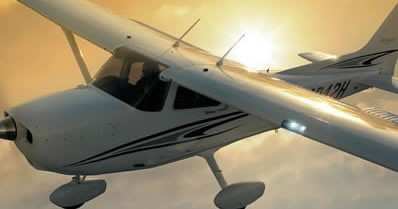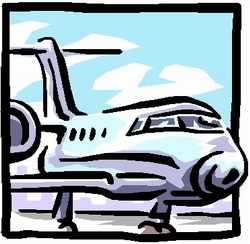New Alliance Rapidly Gaining Strength
More and more groups opposing the FAA's proposed user fee
program are mobilizing and joining forces in their fight... and if
some of the names already on the roster are any indication, this
association could very well grow into a force the FAA and airlines
might do well not to reckon with.

Representatives from rural and agricultural groups, charitable
organizations, community airports, as well as aviation
professionals, local officials and small businesses have announced
the formation of the Alliance for Aviation Across America. This is
a coalition formed specifically to fight the "user fees" proposal
that threatens to impose serious tax hikes on small businesses and
towns across America.
Coalition members include the League of Rural Voters, National
Association of State Aviation Officials, Air Care Alliance,
National Farmer's Union, National Agricultural Aviation
Association, the National Business Aviation Association, Angel
Flight, Aircraft Owners and Pilots Association and hundreds of
small and medium-size businesses from around the country, according
to the Alliance.
"Our coalition is here to send a clear message to lawmakers that
we stand united against a radical "user fees" proposal which would
decimate businesses and communities around our country through a
huge tax hike. This special interest legislation would
benefit no one but the big commercial airlines," said Gene Wright,
Mayor of Quinwood, WV, and a pilot and coalition
member.
 As Aero-News has reported,
the FAA's "user fees" proposal was introduced as part of a plan to
reauthorize the agency for another four years. It would directly
offset a multi-billion dollar tax break for the airlines by
imposing a new tax hike on general aviation -- the businesses,
organizations and farmers and ranchers that use small planes.
As Aero-News has reported,
the FAA's "user fees" proposal was introduced as part of a plan to
reauthorize the agency for another four years. It would directly
offset a multi-billion dollar tax break for the airlines by
imposing a new tax hike on general aviation -- the businesses,
organizations and farmers and ranchers that use small planes.
"The aviation system is funded largely through a mix of taxes on
each aviation segment, which are paid into the Airport and Airways
Trust Fund (AATF). The taxes going into the AATF are generating
record revenues, and will be sufficient to fund all modernization
programs. In fact, the Congressional Budget Office anticipates a
continued increase in revenue through 2016, and the White House
Office of Management and Budget expects the AATF to top $21 billion
by 2012," said Donald B. Marron, Acting Director, Congressional
Budget Office, speaking to the Committee on Transportation and
Infrastructure, Subcommittee on Aviation, US House of
Representatives, on September 27, 2006.
User fees programs currently in use in Europe have become
"suffocating and extensive," said Carl Davis, coalition member and
small business owner. They now include everything from pilot
certification to safety-related weather checks.
The FAA's proposal also includes a tripling of the tax on
aviation fuel to $.70/gallon, up from the current rate $.19 on
average.

"Adding an additional 50 cents on top of the existing price
could cripple general aviation." said Rep. John Salazar (D-CO), at
the House Transportation and Infrastructure Committee, Subcommittee
on Aviation on March 21.
"This self-serving proposal is based on a flawed argument that a
plane carrying four passengers should be taxed the same amount as a
plane carrying 400 people even though the experts and small
businesses such as ours know that it is the airlines that drive the
majority of the costs of the hub-and-spoke system," Bob Simmers,
Aircraft Management Systems, told the Grand Forks Herald on March
10.
Pilot and coalition member Coz Passalacqua agrees. "This
hub-and-spoke network, which moves thousands of flights through big
hub airports, particularly during peak hours, is what creates the
demand for most of the staff and resources, including senior air
traffic controllers and specialized equipment."
 The major airlines
insist the proposal is critical for modernization, but they don't
seem to realize it not only cuts the airline's contribution to
modernization efforts, but slashes overall FAA funding by more than
$600 million -- money that could fund modernization efforts,
according to the coalition.
The major airlines
insist the proposal is critical for modernization, but they don't
seem to realize it not only cuts the airline's contribution to
modernization efforts, but slashes overall FAA funding by more than
$600 million -- money that could fund modernization efforts,
according to the coalition.
"The system is not broken" said Chip Gibson, coalition member
and Mississippi-based small-business owner. He notes the AATF is
generating record revenues, and the Inspector General of the
Department of Transportation, the Congressional Budget Office, and
the Government Accountability Office have all testified before
Congress that the current funding structure can support the
estimated costs of modernization.
Members of the newly-formed coalition have also questioned
whether user fees are really just a thinly-veiled effort to begin
the process of privatizing the air traffic control (ATC) system,
reduce Congressional oversight, and give airlines substantially
more control over the day-to-day management of the system.
"We need to modernize our air traffic control system through
full funding and accountability. Cutting $600 million in
funding for our air traffic control system and levying billions in
taxes on small towns and businesses is just wrong," said
Wright.
The AAAA cites numerous expert opinions that say the
airline-backed proposal could impose severe economic hardship on
airports, small towns and communities which are served by the
general aviation industry but pretty much ignored by commercial
airlines.
"Community airports that serve small towns are critical to our
security, our mobility during national emergencies, and to our
local economies" said Niel Ritchie, president of the League of
Rural Voters and coalition member. "General aviation is crucial for
medical care, disaster relief, traffic enforcement on rural
highways, wilderness search and rescue, and business growth for
small communities. In fact, during Hurricane Katrina, when roads
were often impassable due to heavy flooding, some 400 small
aircraft evacuated around 23,000 people and delivered tons of
supplies to relief workers in just five days.
"The airline-backed plan is a poison pill for rural towns and
communities across America," Ritchie continued. "This huge tax hike
would ground many of these small planes and puddle jumpers that are
the lifeline to these communities, impacting access to specialized
medical care, disaster relief, and business resources."
The FAA proposal also slashes funding for the Essential Air
Service Program and the Airport Improvement Program as well as
eliminates funding for the Small Communities Air Service Program,
all of which are critical for airport preservation.
The House Transportation and Infrastructure Committee's Aviation
Subcommittee estimates that approximately 300 airports would lose
their current grant funding under the new proposal. Many small
airport operators fear that if general aviation activity decreases
because of fuel tax increases, aviation-related business activity
would inevitably decrease as well, possibly forcing the airports to
close outright.
 ANN's Daily Aero-Linx (12.03.25)
ANN's Daily Aero-Linx (12.03.25) ANN's Daily Aero-Term (12.03.25): CrewMember (UAS)
ANN's Daily Aero-Term (12.03.25): CrewMember (UAS) NTSB Prelim: Maule M-7-235A
NTSB Prelim: Maule M-7-235A Airborne-Flight Training 12.04.25: Ldg Fee Danger, Av Mental Health, PC-7 MKX
Airborne-Flight Training 12.04.25: Ldg Fee Danger, Av Mental Health, PC-7 MKX Aero-News: Quote of the Day (12.04.25)
Aero-News: Quote of the Day (12.04.25)






